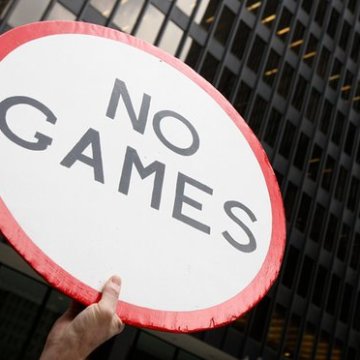- About
- Topics
- Picks
- Audio
- Story
- In-Depth
- Opinion
- News
- Donate
- Signup for our newsletterOur Editors' Best Picks.Send
Read, Debate: Engage.
Maybe it's just me, but I think the Olympics have been pretty good this year. I mean, Usain Bolt defended his 100m gold for the second time - the first time in history an athlete has one 3 consecutive men's 100m golds. Simone Biles is single-handedly (multiple-limbedly) re-inventing an entire sport, Michael Phelps proved that he's not through just yet, and there have been plenty of touching moments besides.
I mean, the spectacle, the competition - that's been good, but at the expense of thousands of Rio's poorer residents and in general, the democratic processes which ensure the freedom of its people, and the accountability of its politicians. We've already spoken at length about increased militarisation of police forces, and the peculiar realignment of militarisation around sporting events - as though sports were somehow a universal good which justified exceptional protection from states, including protection from those people whom the events are supposed to directly benefit - the locals.
Sports and other events are of course used as major propaganda tools - this everyone knows. They create intense emotions which can be driven towards a nationalist end. They also provide politicians with easy answers when it comes to soaring commercialisation and police brutality (well, don't you want the games to go ahead?)
And since it seems the Olympics, the World Cup, the Commonwealth Games etc. aren't going anywhere i.e. they're not going to stop, simply because some people want them to - indeed, millions upon millions of people want them to continue - the problem is therefore: How do we have sport without making local populations suffer, and meanwhile making politicians and corporations accountable?
This is an enormous question - one too large for the likes of this column. At first glance, the answer seems to be to say - the Olympics and other sports should either be rejected by populations (e.g. like they were in Hamburg and Berlin), or something fairly close to establish a clear set of criteria which means that these events can only take place in countries with a certain level of development; Not 'developed enough to hold the games', but 'developed enough so there is a tiny minority of people below the poverty line'.
The latter seems to be a very clumsy answer. After all, the magnetic pull of sports is very much that they provide hope, inspiration and entertainment for people - to say that they should just be gotten rid of is an untenable position. Therefore, the proposition I think that most realistically captures the ideal of what is required for these sports is fair, transparent and localised referenda. Which is indeed what is happening. The Guardian reports:
"Oslo had cancelled its bid for the 2022 Winter Olympics because there was so little public support for it. Earlier in the year, Stockholm withdrew for similar reasons. Krakow also cancelled after a referendum found almost 70% of residents opposed the bid. For Munich’s bid, the figure was nearer 60%. For Davos, it was 53%. In Barcelona, the mayor deferred until 2026, then canned the plan altogether. A similar thing happened in Quebec City. So from nine candidates, the IOC was left with two potential hosts. One was Almaty, in the dictatorship of Kazakhstan, and the other was Beijing, not hitherto noted as one of the world’s great winter sports resorts. Beijing won, though most of the events will be held 140 miles away in Chongli."
I think this is a first step forward.
